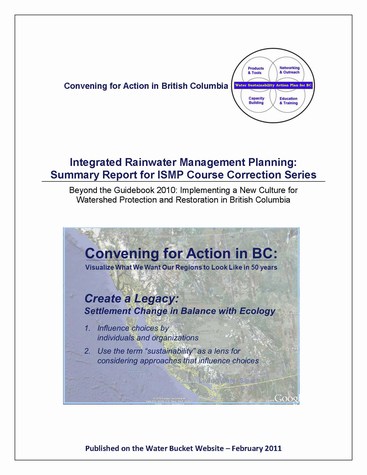Leaders By Example: City of Surrey, District of North Vancouver and Bowker Creek Initiative
Note to Reader:
ISMP is the acronym for Integrated Stormwater Management Plan. In the late 1990s, the genesis for ISMPs was a desire by local governments to integrate the community, engineering, planning and environmental perspectives.
A decade ago, local governments were venturing into uncharted waters when undertaking ISMPs. Now, the collective experience of the Bowker Creek Initiative (in the Capital Region), the City of Surrey and other pioneer leaders such as the District of North Vancouver serves as a guide for an approach that connects with the community and gets the watershed vision right. The article below is extracted from a report released in February 2011.
To fill a professional development need, the Partnership for Water Sustainability in British Columbia is offering a 2-day course titled ISMP Course Correction: Achieve More with Less. Peer-based learning will be provided by an inter-governmental team. Lead members of the ISMP Course Correction Team are Carrie Baron, Richard Boase and Jody Watson.
ISMP Course Correction Series
During the period November-December 2010, the Partnership for Water Sustainability in British Columbia.released a 5-part series about considerations driving a course correction in the way ‘Integrated Stormwater Management Plans’ (ISMPs) are undertaken.
Then, in February 2011, the Partnership released the Summary Report for ISMP Course Correction Series to guide those about to embark upon an ISMP process. This guidance document highlighted what can be learned from the champions in local government who are leading the paradigm-shift to landscape-based from model-centric watershed planning.
 “The City of Surrey, Bowker Creek Initiative and District of North Vancouver stand out because of their sustained commitment to outcome-oriented approaches: Establish the vision, set the target, and then implement,” observes Corino Salomi of the Department of Fisheries and Oceans (DFO). He is Area Manager, Oceans, Habitat & Enhancement Branch, Lower Fraser Area.
“The City of Surrey, Bowker Creek Initiative and District of North Vancouver stand out because of their sustained commitment to outcome-oriented approaches: Establish the vision, set the target, and then implement,” observes Corino Salomi of the Department of Fisheries and Oceans (DFO). He is Area Manager, Oceans, Habitat & Enhancement Branch, Lower Fraser Area.
Why Each is a Leader
 “Surrey has more ISMP experience than any other jurisdiction in BC. Now in its fifth decade of continuous implementation experience, the City continues to evolve and adapt a watershed–based approach that incorporates lessons learned in getting green infrastructure built right,” reports Carrie Baron, the City’s Manager of Drainage and Environment.
“Surrey has more ISMP experience than any other jurisdiction in BC. Now in its fifth decade of continuous implementation experience, the City continues to evolve and adapt a watershed–based approach that incorporates lessons learned in getting green infrastructure built right,” reports Carrie Baron, the City’s Manager of Drainage and Environment.
 “The District of North Vancouver is working towards a District-wide ISMP. The current Official Community Plan Update created the opportunity to embed the vision for a Watershed Landscape Restoration Strategy. Over time, this strategy would restore the rainfall absorption capacity of its watersheds, one property at a time,” states Richard Boase, the District’s Environmental Protection Officer.
“The District of North Vancouver is working towards a District-wide ISMP. The current Official Community Plan Update created the opportunity to embed the vision for a Watershed Landscape Restoration Strategy. Over time, this strategy would restore the rainfall absorption capacity of its watersheds, one property at a time,” states Richard Boase, the District’s Environmental Protection Officer.
 “The Bowker Creek Initiative demonstrates what can be accomplished through a regional team approach. Four partner local governments are implementing the Bowker Creek Blueprint. This is a 100-Year Action Plan to restore the watershed landscape in the heart of the Capital Region,” reports Jody Watson, Chair of the Bowker Creek Initiative.
“The Bowker Creek Initiative demonstrates what can be accomplished through a regional team approach. Four partner local governments are implementing the Bowker Creek Blueprint. This is a 100-Year Action Plan to restore the watershed landscape in the heart of the Capital Region,” reports Jody Watson, Chair of the Bowker Creek Initiative.
Planning Framework
Lessons learned by those who have developed watershed-based plans can help those who are about to embark on an ISMP process.
Focus on values and actions. Keep it simple. Find a starting point that is intuitive to everyone. Ensure actions are practical and easy to implement.
Think at multiple scales. Ask ‘what can I do for the watershed?’
“The notion of ‘shared responsibility’ is a foundation piece for collaboration, alignment and integration. When these are in place, innovation will follow,” concludes Rémi Dubé, Acting Development Services Manager with the City of Surrey. Previously he was Drainage Planning Manager. Together with Carrie Baron, he has played a key leadership role in evolving Surrey’s watershed-based approach.
“The 2-day course will benefit all those who are involved in land use planning, infrastructure development and municipal infrastructure. We will show how to integrate the site with the watershed and the stream,” concludes Carrie Baron.

Posted October 2011



